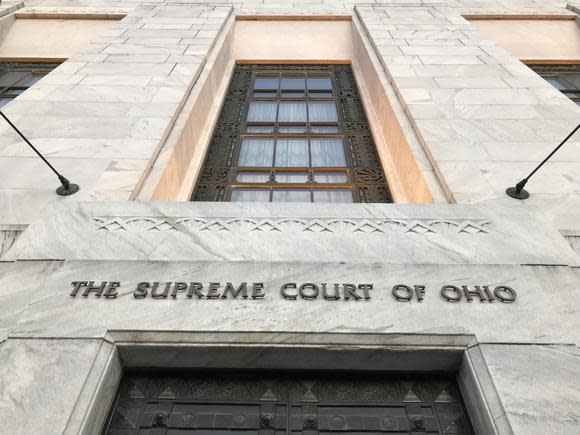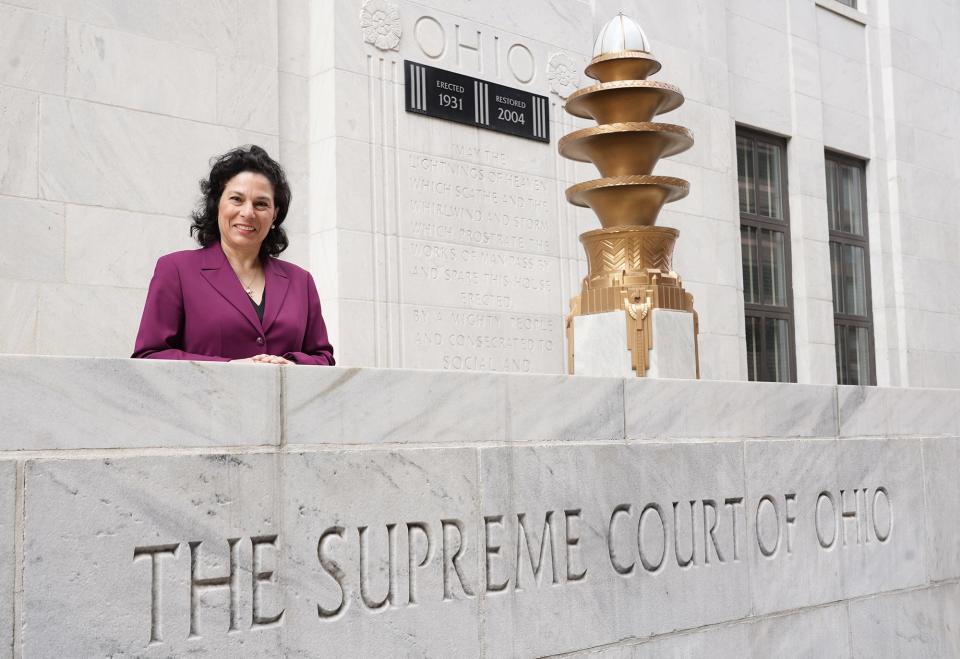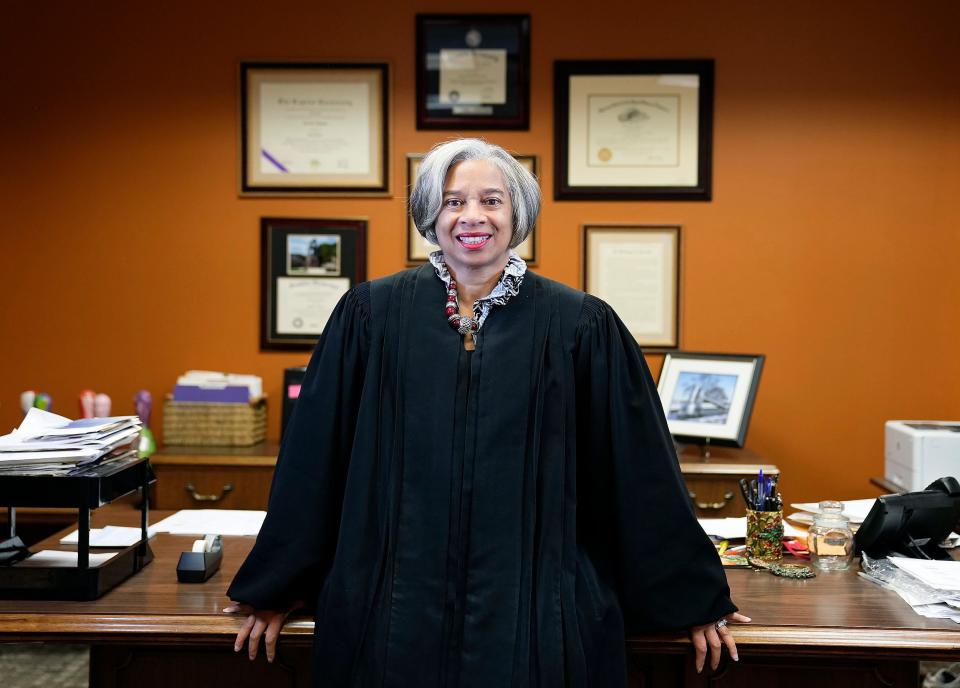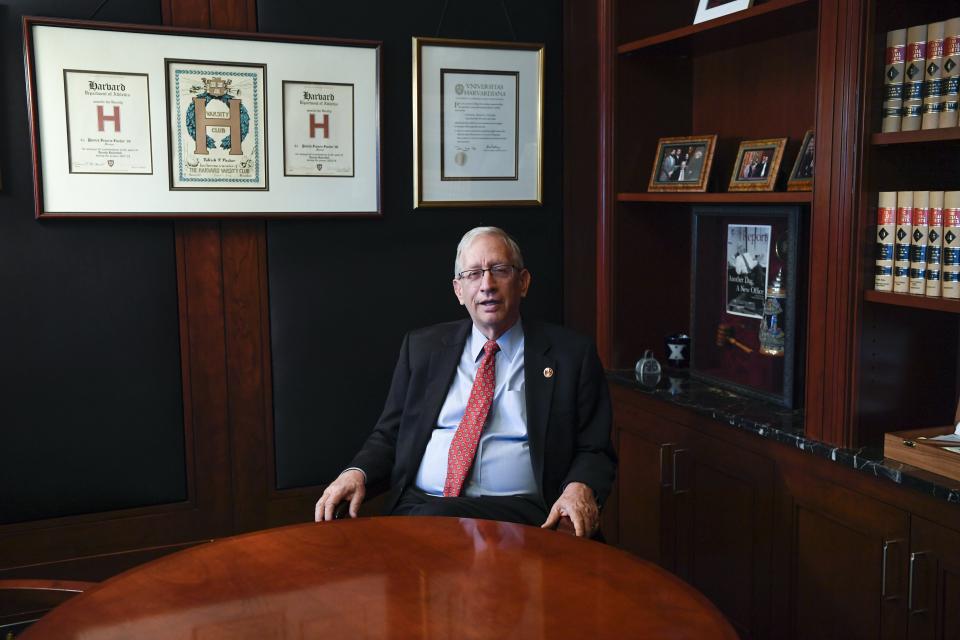Who is running for Ohio Supreme Court? Ohio voters to decide balance of court this year
The balance of the Ohio Supreme Court hinges this fall on whether two under-funded Democrats on the appellate bench can defeat two incumbent Republican justices named Pat from Cincinnati.
Justice Patrick Fischer is being challenged by 10th District Court of Appeals Judge Terri Jamison and Justice Pat DeWine is challenged by 1st District Court of Appeals Judge Marilyn Zayas.
In recent elections, Democrats have picked up supreme court seats and now hold three of the seven but Republicans have held the court majority since 1986. If DeWine and Fischer both win, Republicans will continue to hold that majority.
This year will be the first time party labels will be listed on the ballot for supreme court and appellate court judicial candidates.

Balance of the court: 2022 election will bring different Ohio Supreme Court to ongoing redistricting battles
If the women win, Zayas would be the first Latina to serve on the high court and Jamison would be the third Black woman. Of the 162 justices that have served since 1803, four have been Black and 13 have been women.
Zayas and Jamison both favor establishing a criminal sentencing database across Ohio courts, which would provide data to see how similarly charged people are treated across courts. DeWine and Fischer said they need more information about how the database would operate before deciding whether to support it.
Supreme Court decisions impact how much Ohioans pay in taxes, whether utility companies can add fees to ratepayers' bills, how insurance and business laws are interpreted, what government records will be available to the public and more. The court also plays an enormous role in ruling whether legislative and congressional maps created by the Ohio Redistricting Commission are constitutional.
Justices serve six-year terms.
Who is Marilyn Zayas?

Zayas, who grew up in Spanish Harlem and Brooklyn, vividly remembers visiting family court in New York as her mother fought for custody amid a contentious divorce.
Zayas, who acted as an unofficial translator for her mom, recognized that lawyers helped people's voices be heard – something that sparked her interest in becoming a lawyer.
Instead of pursuing that path, Zayas studied computer programming, which she viewed as a sure bet for economic security and achieving her goals of leaving New York City and owning a home with a yard.
After graduation, Zayas jumped at a job offer from Procter & Gamble and immediately felt at home in Cincinnati.
Still, the dream of becoming a lawyer stuck with her. While pregnant with her third child, Zayas began studying for the LSAT and started law school at the University of Cincinnati following her maternity leave.
She practiced intellectual property law for a firm in Colorado but returned to Cincinnati and took a job as a Hamilton County public defender and later operated her own firm, specializing in immigration, juvenile, family and criminal matters.
As a political newbie, she ran for the First District Court of Appeals in 2016, beating a Republican incumbent.
She said she would've ruled differently than DeWine on the redistricting cases as well as a bail case. In a 4-3 ruling issued in January, the court found the state constitution and U.S. Constitution prohibit setting excessively high bail just to keep someone charged with a crime in jail before trial. DeWine dissented. Zayas said she would have agreed with the majority opinion.
She also said she would have sided with the majority in the legislative and congressional redistricting cases where political maps were deemed unconstitutional. DeWine dissented in those cases.
Zayas decided she needed to run for Ohio Supreme Court.
"Not because it's easy but because it's necessary. For this seat, it's absolutely necessary. This is really about the integrity and independence of the court and it's about serving everybody," she said. "I'm not here to serve one group of people. I'm here to serve everyone."
Zayas: First District Court of Appeals, 2016 to current; computer programmer for Procter & Gamble. Bachelor's degree from City College of New York, law degree from University of Cincinnati.
Who is Pat DeWine?

As the oldest child of Ohio Gov. Mike and Fran DeWine, Pat DeWine literally grew up in Republican politics. Hanging on his office wall is a photo of a young Pat DeWine with his parents, siblings and President Ronald Reagan. But he came to a career in politics and the law later in life.
Even when he started attending University of Michigan Law School, he wasn't sure he wanted to practice law. But in his third year, a clerkship with the 6th Circuit Court of Appeals changed that.
"I loved that. To me I just thought it was a fascinating job. You get to see so many different things," he said. "That kind of got me on the path."
DeWine was in private practice and held local elected office but decided to run for the bench as a way to focus on the law but also continue public service.
DeWine served as a trial court judge and appellate judge before winning a seat on the Ohio Supreme Court in 2016. "I love the face that we make decisions that have a real impact for the entire state," he said of the high court.
DeWine describes himself as a "textualist" – a judge who sticks to the plain reading of the law – and supports the rule of law and creating a predictable legal environment.
He noted that in Third World countries, the lack of predictability drives away business investment. "I think Ohio is at risk of having a legal environment that's not very stable, not very predictable," DeWine said.
DeWine said businesses want a stable legal environment or they consider going elsewhere.
While it has yet to make endorsements, the Ohio Chamber of Commerce announced it plans to to raise and spend $4 million in the supreme court races this fall.
DeWine said a healthy supreme court is one with judges that apply the law as written and understand the court isn't a policy-making branch. "Do we have that now? I'm concerned, frankly," he said.
DeWine noted the 4-3 decision over setting bail, citing it as an example of the court "going beyond what its authority is in law and instead imposing its own policy preferences."
Critics have hammered DeWine for not recusing himself in the highly contentious redistricting cases. DeWine, however, said no party specifically asked him to recuse and his father is one of seven members of the Ohio Redistricting Commission.
"What I did in those cases is the same as I've done in every case since I went on the court – determine whether my father had some kind of personal interest or super personal benefit from a case. If he does, I recuse myself. If he doesn't, I have a duty to hear the case that the voters elected me to hear," DeWine said.
DeWine: Ohio Supreme Court, 2017 to current; First District Court of Appeals; Hamilton County Common Pleas Court; Hamilton County commissioner; Cincinnati City Council. Bachelor's degree from Miami University, law degree from University of Michigan.
Who is Terri Jamison?

Jamison grew up in Welch, W.Va., where she began her education in segregated schools. She considers Brown v. Board of Education as the first case to personally impact her since it eventually led her to attending integrated schools.
Republican justices on the Ohio Supreme Court often stress the importance of a strict reading of laws and avoiding legislating from the bench. Jamison noted that when the U.S. Constitution was written, Black Americans weren't counted as citizens.
Diversity on the Bench: 'Rooting for her': Black women judges in Ohio on nomination of Ketanji Brown Jackson
"I look at the law from a very different perspective because I understand that the role of a judge is to give equal protection under the law. It is to give us the right to have equal rights in these United States," she said in an address to the Federalist Society.
She added that the courts have the right to interpret legislation and make sure it is constitutional, applied equally and citizens' rights are protected.
Jamison took a long, winding path to the judicial bench.
She worked as an underground coal miner but after a layoff, she moved to Columbus. After job training, she worked in a series of businesses, including an insurance agency. Eventually she ran her own agency for more than 16 years.
While working, she took classes at Columbus State Community College, transferred to Franklin University and graduated with a business degree. She sold her insurance agency to go to Capital University Law School. After a stint as a county public defender, Jamison started her own firm, focusing on criminal, juvenile, domestic and appellate work.
In 2012, she won a seat on the Franklin County Common Pleas bench in the domestic relations-juvenile division. In 2018 she won reelection.
Jamison, who is married to a retired deputy sheriff in Franklin County, said she supports law and order "but I am in favor of the law being applied to everyone equally and everyone treated the same."
She said her working class background, varied work history and experience holding trials gives her an important understanding of people and where they may be coming from.
"I think they need another justice who is independent and believes in the independence of the third branch of government, to be a check and balance on the legislature and the executive branch by interpreting the law as written, to be sure that it is constitutional and grants equal justice under the law to everyone – making it a reality for everyone," Jamison said.
Jamison noted that redistricting may return to the Ohio Supreme Court in 2026 when the four-year maps expire. So election of justices in 2022 and 2024 are key. "That's how critical this election is....So, if we want an independent judiciary in the Supreme Court, we need to choose wisely in '22 and '24."
Jamison: Tenth District Court of Appeals, 2021 to current; Franklin County Common Pleas, 2012-2020, private practice attorney, Franklin County assistant public defender, insurance agency owner. Associate's degree, Columbus State Community College; Bachelor's degree, Franklin University; law degree, Capital University. Former coal miner in West Virginia.
Who is Pat Fischer?

As a kid growing up in Fort Thomas, Fischer was called as a witness when his brother Joe was charged with reckless driving.
Fischer was immediately taken in by the courtroom, the repartee between lawyers and the judge, the ambience and even the fresh smell of lemon Pledge on the furnishings.
"I always wanted to be a lawyer from eighth grade on when I testified at that trial," Fischer said. "I was the last one to testify. I was out in the hallway all by myself. I was 14 years old. They opened those big wooden doors and I walked up there and I loved it."
His brother Joe, who was acquitted, is a Kentucky state lawmaker and now running for the Kentucky supreme court.
Pat Fischer took a direct path to the law. He graduated St. Xavier High School and went to undergraduate and law school at Harvard.
After graduation, Fischer spent 27 years in private practice, most of it at Keating Muething & Klekamp, a Cincinnati-based corporate law firm.
But an experience in a 2004 election law case convinced him that he wanted to be a judge.
He represented intervenors in a federal case during the 2004 presidential election between George W. Bush and John Kerry. Fischer's side lost at the trial level, won an appeal and the other side took it to the U.S. Supreme Court – all with blazing speed and urgency.
"I got a decision from Justice John Paul Stevens at 5:27 a.m. and then I went to vote for president and realized I wanted to be a judge," he said.
In 2010, Fischer won a seat on the 1st District Court of Appeals where he served until his election to the Ohio Supreme Court in 2016.
"I love the research. I love the writing. I love the time available to think," he said of his work on the high court.
When asked why voters should back him, Fischer said "I am not just the most qualified candidate but also the one who cares more in his heart about making sure that the rule of law continues in this state and in this country."
When asked how he knows what's in Jamison's heart, Fischer responded: "I know that no one could have more intensity for the law. I gave up so much to be here."
The career shift from law firm partner to judge meant he took a steep pay cut, he said.
Fischer said he favors applying the law as written, not legislating from the bench or allowing his personal feelings about a law influence his rulings.
When it comes to the redistricting cases, Fischer joined the minority on the court and voted to uphold the Republican-drawn legislative and congressional maps as constitutional. The cases exposed a divide on the seven-member court but Fischer noted that in his dissents he criticizes the opinion and legal reasoning – not the individual justices.
It's important to know how to disagree without being disagreeable, he said. "That would help our entire country and it would the reputation of lawyers."
Fischer: Ohio Supreme Court, 2017 to current; First District Court of Appeals, 2011 to 2016; Bachelor's and law degrees from Harvard University.
Laura Bischoff is a reporter for the USA TODAY Network Ohio Bureau, which serves the Columbus Dispatch, Cincinnati Enquirer, Akron Beacon Journal and 18 other affiliated news organizations across Ohio.
Get more political analysis by listening to the Ohio Politics Explained podcast
This article originally appeared on Cincinnati Enquirer: Who is running for Ohio Supreme Court? Two open seats, chief justice

